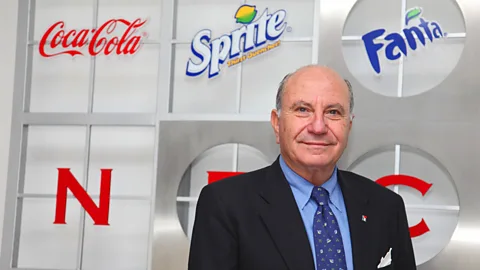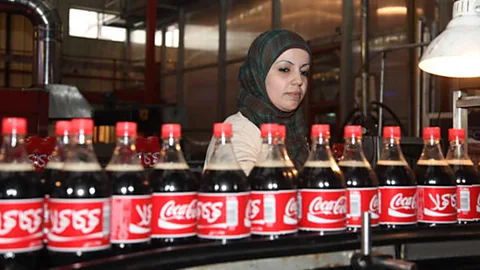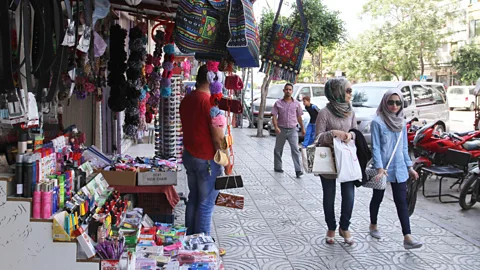The story of Coke's rise on the Gaza Strip
 Coca-Cola
Coca-ColaAfter nearly 50 years living abroad, Zahi Khouri returned home and has done what many predicted would be impossible, opening a $20m Coca-Cola bottling factory on the Gaza Strip.
Zahi Khouri was nine when his Palestinian Christian family left their home in Jaffa. It was 1948; modern Israel was being born, and his parents, listening to the messengers running into town with news of fighting, decided to leave.
He’s always second-guessed that decision by his parents. "It was a mistake to leave," the now 77-year-old said. "It's your home."
And that’s why Khouri went back. After a career that saw him climb to the position of president at the giant Saudi Arabian consumer conglomerate, the Oylayan Group, he returned in 1997 to run a Coca-Cola franchise, now a $100m operation and the third-largest employer in the territory, with 450 staff.
 Coca-Cola
Coca-ColaThis month, he is doing something many predicted would be impossible, opening a new $20m Coca-Cola bottling factory in the Gaza Strip. It’s the first significant economic development in decades in a territory with a 42% unemployment rate, among the highest in the world. The plant, owned by Khouri’s company, will directly employ 250 and, including people working for suppliers and subcontractors, provide employment to an estimated 1,000 more people.
After a stellar career and with plenty of money saved, Khouri could have retired to Florida in the US, where he owns a home. Instead, he joined the millions of people over 50 around the world who embark on second acts, be it entrepreneurship, volunteerism, pursuing a long-held passion, or a mix. For expats and refugees, the path sometimes leads home.
Of course, not everyone goes to the extreme like Khouri, who returned to one of the hardest places in the world to live, let alone run a business.
"When you have McDonald's or Coke, you put a country on the map," he said, explaining his thinking, which began to form after the 1993 Oslo Peace Accords.
A refugee story
Khouri's stature in the business world, his alliance with Coke, and his relentless optimism have enabled him to stick to his business-building in the Gaza Strip for nearly 20 years.
 Courtesy of Coca-Cola
Courtesy of Coca-ColaAfter his childhood as a refugee in Lebanon, he attended university in Germany, arriving there in a coat donated by the United Nations. He completed an MBA at INSEAD in Fontainebleau, and then worked for US manufacturers such as Reynolds Metals Company and Phelps Dodge from 1967 to 1972, cutting his teeth as a leader in an era of labour disputes. "My plant was the only one without a strike," he said of time spent with Phelps Dodge at its operations in Brazil.
The time spent with American companies enabled him to become a US citizen. In 1973, he was one of the management team that formed American Express’s investment bank in Beirut. He signed a management agreement that gave him an equity stake in the Oylayan Group, a Saudi Arabian company that which holds licenses for Coca-Cola, Nabisco and General Foods, among others. Working between New York and Saudi Arabia, he spent 20 years with Oylayan, retiring as president of its holding company in 1994.
But he didn’t retire to a life of leisure. "I'll be hanging around when I lie horizontally forever," he said. It took him two years to lobby Coke to open the factory. Product finally rolled out of the factory in 1998.
"I felt, 'I'm back to being a first-class citizen'," he said of his return after so many years. In his long career elsewhere, he said, "I felt like a guest."
But the place he remembered in scraps of childish recollections had changed, of course. "When I left, Jaffa was a highly-cultured city. We had the only country club, churches, a lot of elegance," he said.
In the years he has been back, though, Jaffa has gone from an informal settlement of Tel Aviv to a popular beachfront resort, but he still feels a sense of loss over what once was, he said.
Faith and defiance
If you're going to take on an ambitious second act, it helps to have a passion for the cause, said Freedman. A healthy dose of defiance is important because not only are you defying expectations for older people, but you are also risking your own ego and reputation.
Khouri's road has been harder than he expected. Conflict between Israelis and representatives of Palestinian groups has dragged on, and Khouri has run his factory through two intifadas and last year's Gaza conflict, importing supplies and ingredients through a tight Israeli inspection regime. During the second intifada in 2002, many roads were blocked. "We delivered our product on the backs of donkeys," he said with a laugh. The latest accomplishment, opening the factory is seen as another feat: "It is hard to describe the impact of what he is doing," said Kito de Boer, head of mission of the Office of the Middle East Quartet, the diplomatic group based in Jerusalem traditionally tasked with mediating between Israel and Palestinians. "His plant is rising out of the wreckage of what is effectively 'ground zero' of the last conflict."
 Alamy
AlamyKhouri took substantial financial risk to return and establish the company, investing $3m of his own money in the factory along with two other equal partners. He's also made other investments in the region, including helping to establish Paltel, the telecommunications company, and helping to create a $10mventure capital fund that is investing in technology start-ups, including a portal to help consumers make car-buying decisions and a design portal for the Arab world that is focusing on invitations.
Has it been worth it? “I feel a sense of accomplishment. I'm dealing with a lot of young people, and they give me hope that there is a great future,” he said. But, he added, he doesn’t believe he will see peace in his lifetime.
Failure isn’t an option
Khouri has become a spokesman for the Palestinian business community, which means walking a tightrope between the interests of his homeland, his corporate partner, the Coca-Cola Company, and political neighbours. His views have come under fire in a region charged with conflict.
Those that know him call him an advocate for peace and say he has made a difference. In May of this year, the Nobel Prize winners in peace and economics awarded him and four other global businesspeople one of the annual Oslo Business for Peace Awards.
"That Coke is successful in this part of the world is phenomenal," said Sally Osberg, CEO of the California-based Skoll Foundation, which awards $17.9 million in grants annually, according to Inside Philanthropy, and has supported Khouri's work, investing in Khouri's venture capital fund.
"Before Zahi, my perception of this part of the world was, in a word, was hopeless," said Osberg. "Now I see such potential for self-determination there."
To comment on this story or anything else you have seen on BBC Capital, head over to our Facebook page or message us on Twitter.
Encore Careers
Not everyone works late in life in such an extreme way...
"In the past 50 years, we've opened up a new life stage for many people — a bonus period of continued health and engagement potentially decades in duration," said Marc Freedman, founder and CEO of US-based nonprofit Encore.org. For many, that’s meant thinking more about what they’ll leave behind for future generations.
In the US, nearly 4.5 million Americans between the ages of 50 and 70 are working in encore careers with a social impact, while more than 25 million want to, according to 2014 research by Encore.org and market research firm Penn Schoen Berland. Among Australians, some of the longest-lived people in the world, the percentage of workers over 45 who said they never planned to retire rose from 10.3% in 2006 and 2007 to 12.5% in 2012 and 2013, the latest statistics available from the government.
